Understanding Your Immune System
The immune system is a complex network of cells, tissues, and organs that work together to protect the body from harmful invaders.
The immune system is your body’s sophisticated defense network, comprising white blood cells, antibodies, the lymphatic system, and various organs. When functioning optimally, it identifies and neutralizes harmful pathogens before they can cause significant damage.
Research from the Harvard School of Public Health indicates that proper nutrition is one of the most effective ways to maintain immune function. Specific vitamins and minerals act as critical building blocks for immune cells and antibodies, while others function as antioxidants that protect these cells from damage.
Vitamin C Powerhouses: Citrus Fruits
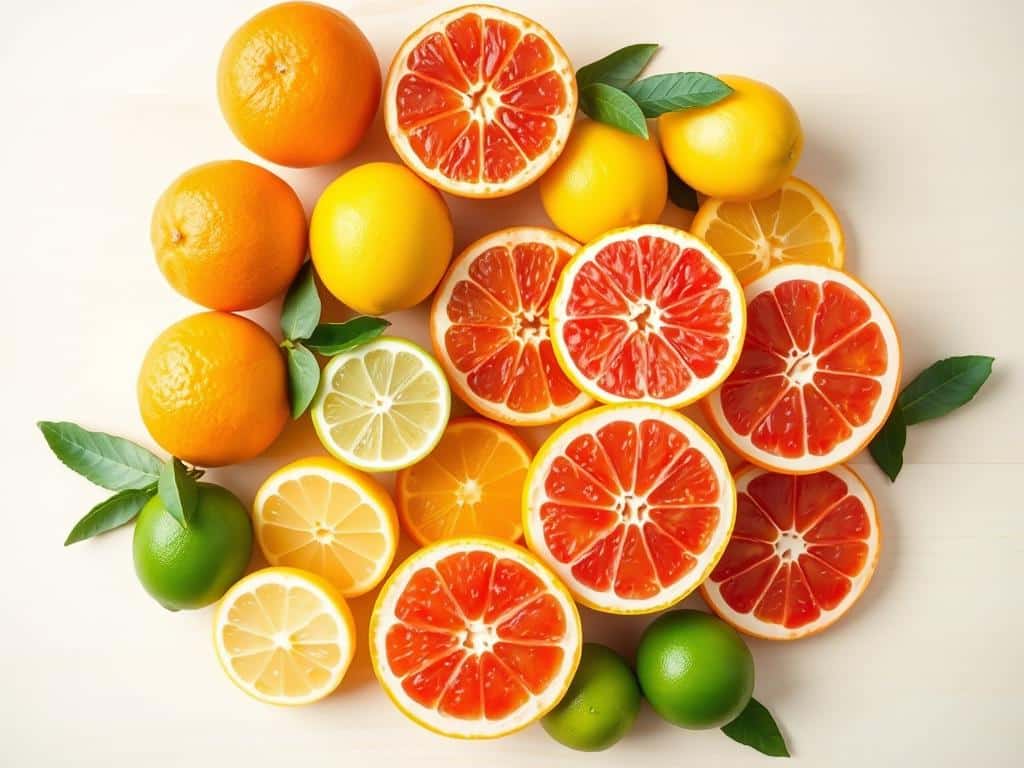
Citrus fruits are renowned for their high vitamin C content, a nutrient that studies show may increase the production of white blood cells—key fighters against infection. According to a 2017 review published in the journal Nutrients, vitamin C contributes to immune defense by supporting cellular functions of both the innate and adaptive immune systems.
Key Benefits: A single medium orange provides about 70 mg of vitamin C, meeting 77% of the daily recommended intake for adults.
The best citrus options include:
- Oranges and tangerines
- Grapefruits
- Lemons and limes
- Clementines
Since your body doesn’t produce or store vitamin C, daily consumption is essential for continued immune support. The recommended daily amount is 75 mg for women and 90 mg for men.
Antioxidant-Rich Vegetables
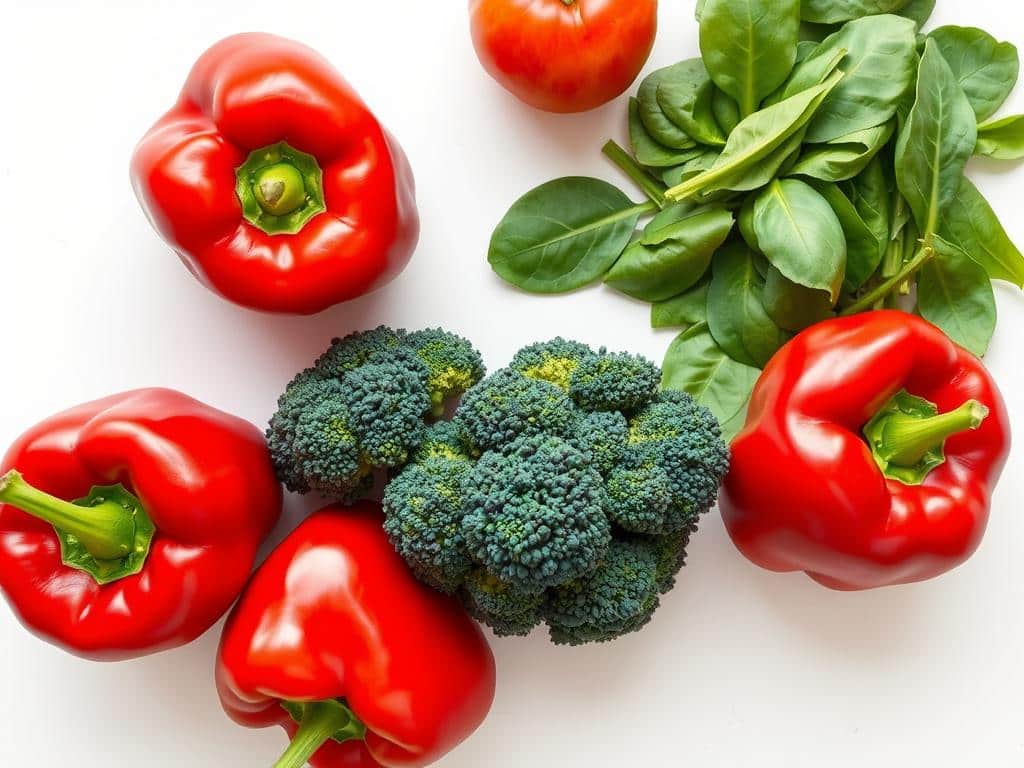
Red Bell Peppers
While citrus fruits get all the vitamin C credit, red bell peppers actually contain nearly three times as much vitamin C as a Florida orange—about 128 mg in a 100g serving compared to 45 mg in an orange. Research published in the Journal of Clinical Biochemistry and Nutrition shows that red bell peppers are also rich in beta-carotene, which your body converts to vitamin A, supporting healthy skin and eye function.
Broccoli
Broccoli is supercharged with vitamins A, C, and E, along with fiber and many other antioxidants. A 2018 study in the Journal of Allergy and Clinical Immunology found that broccoli contains a compound called sulforaphane that switches on antioxidant genes and enzymes in specific immune cells, which combat free radicals in your body.
Spinach
Rich in vitamin C, numerous antioxidants, and beta-carotene, spinach may increase the infection-fighting ability of our immune systems. According to research from the University of California, cooking spinach lightly helps release vitamin A and allows other nutrients to be released from oxalic acid, an antinutrient.
Powerful Immune-Boosting Spices
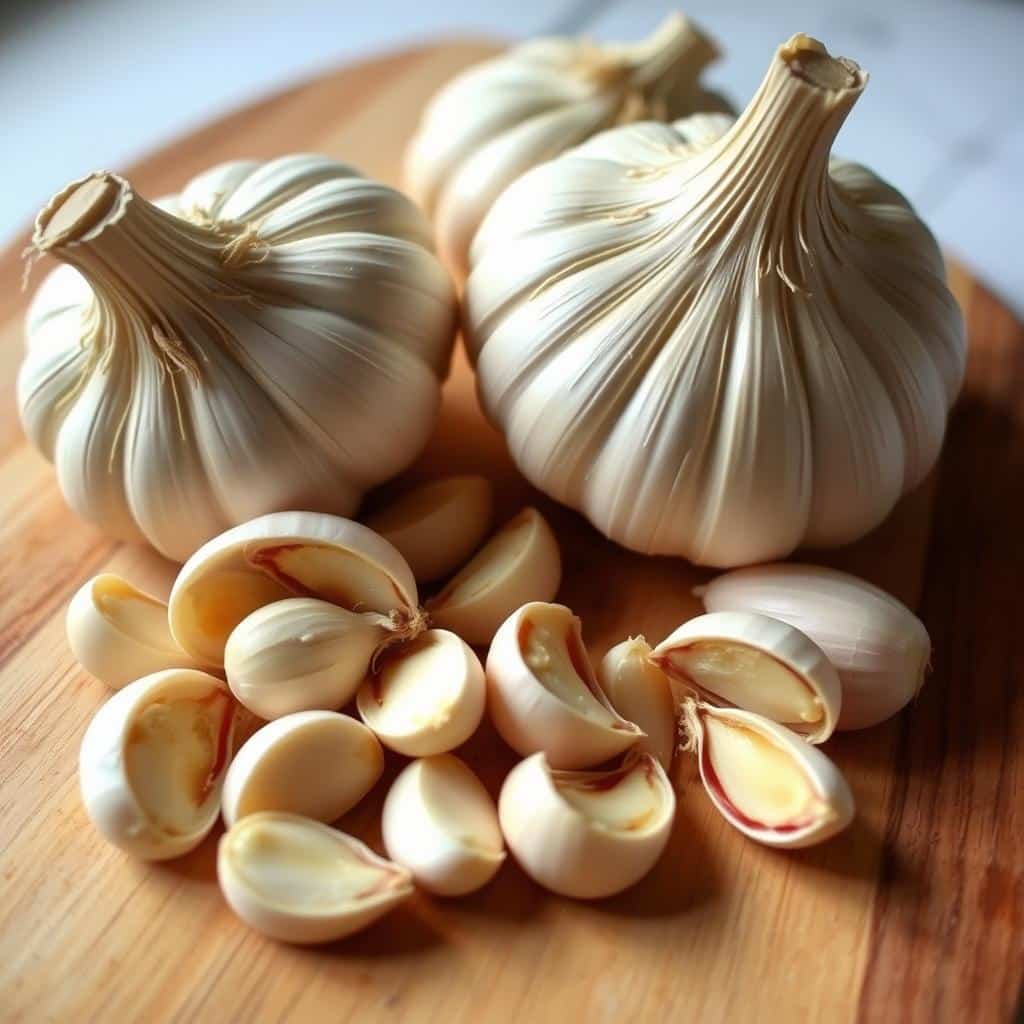
Garlic
Garlic has been used for centuries as an immune booster. Its immune-enhancing properties come from a high concentration of sulfur-containing compounds like allicin. A 2014 review published in Avicenna Journal of Phytomedicine found that garlic enhances the functioning of the immune system by stimulating certain cell types like macrophages, lymphocytes, and natural killer cells.
For maximum benefit, crush or slice garlic and let it sit for 10 minutes before cooking to activate its immune-boosting compounds.
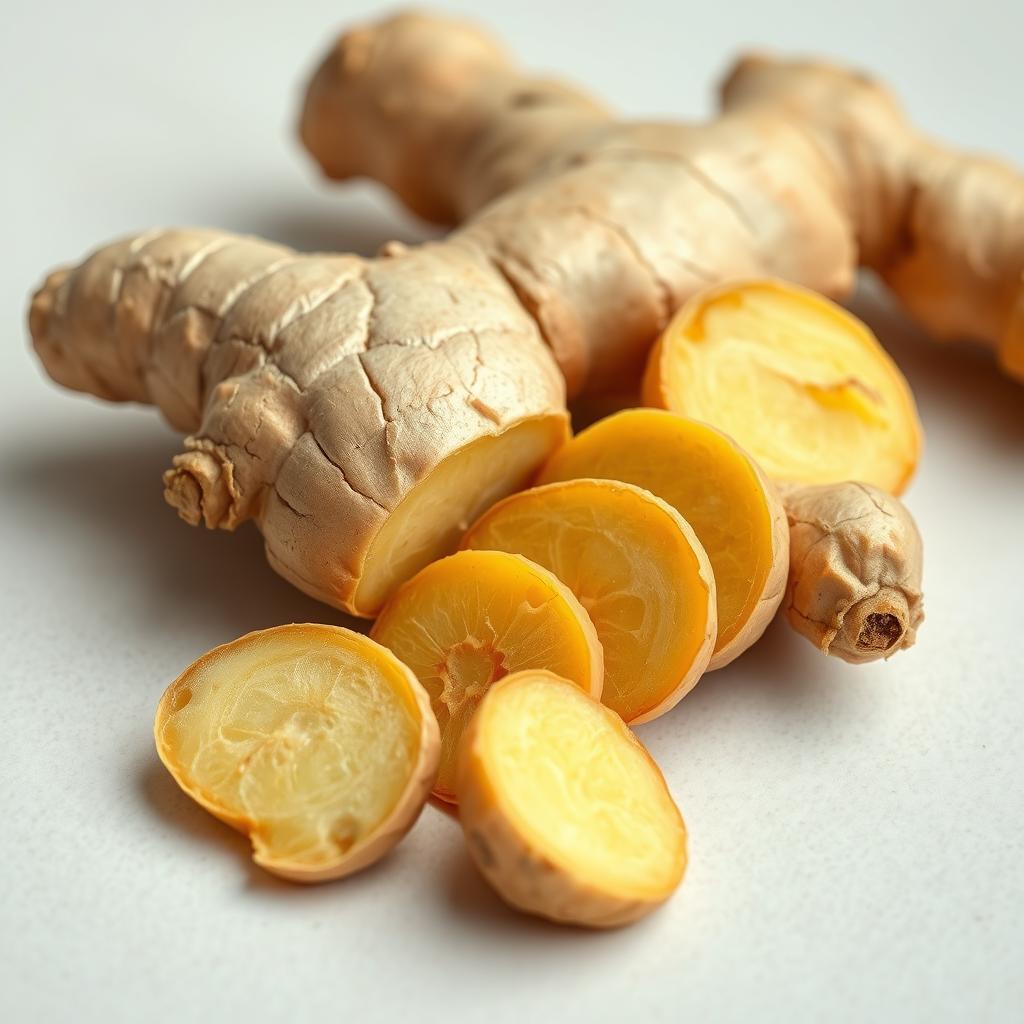
Ginger
Ginger contains gingerol, a bioactive compound with powerful anti-inflammatory and antioxidant effects. According to a 2020 study in the International Journal of Molecular Sciences, ginger can help decrease inflammation, which may help reduce symptoms of inflammatory conditions that can weaken your immune response.
Fresh ginger can be added to soups, stir-fries, or steeped in hot water with lemon and honey for a soothing immune-supporting tea.
Omega-3 Rich Fatty Fish
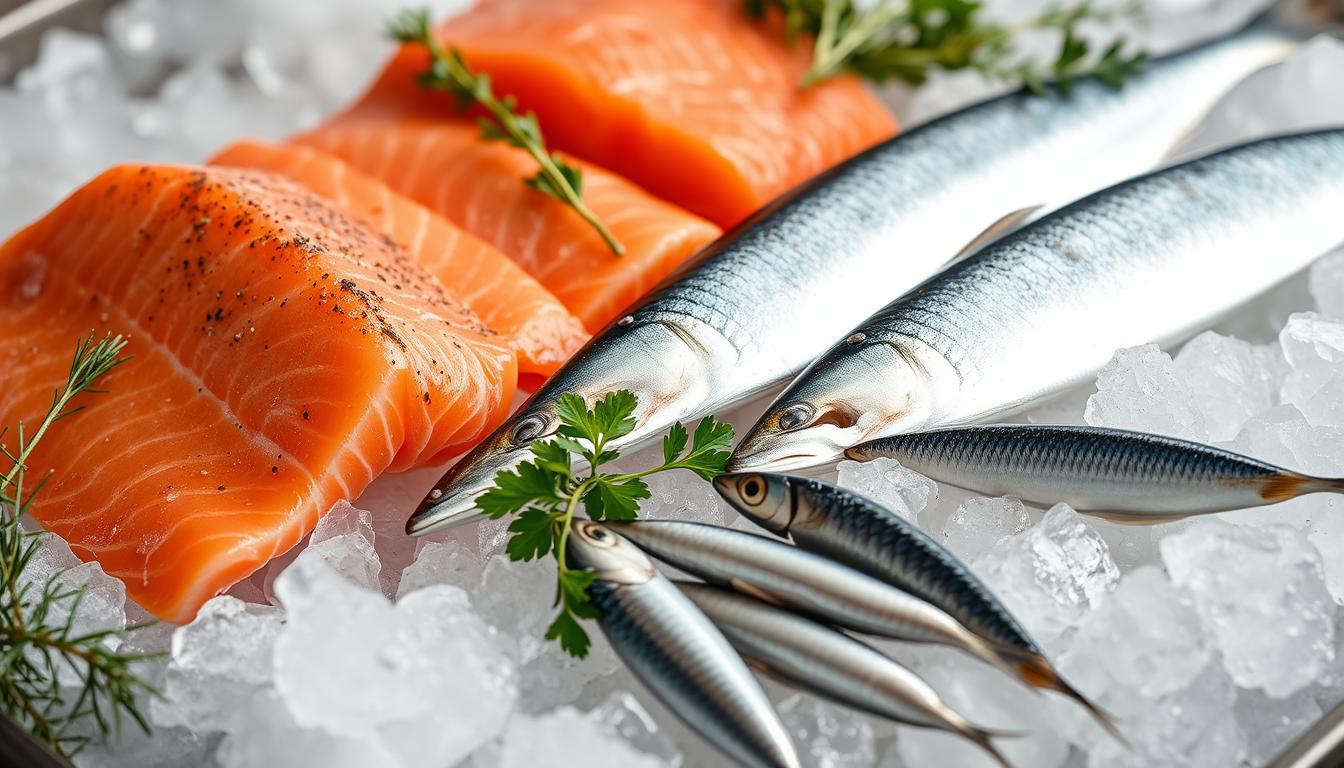
Fatty fish like salmon, mackerel, tuna, and sardines are excellent sources of omega-3 fatty acids, which play a crucial role in enhancing immune function. A 2019 study published in the Journal of Leukocyte Biology found that omega-3 fatty acids increase the activity of white blood cells called B cells, which are vital to immune function.
Top Omega-3 Fish Sources:
- Salmon (wild-caught contains more omega-3s)
- Mackerel (except king mackerel, which is high in mercury)
- Herring
- Sardines
- Albacore tuna
Recommended Intake:
The American Heart Association recommends eating fish twice per week, with each serving being about 3.5 ounces cooked (about 3/4 cup of flaked fish). For those who don’t eat fish, plant-based sources of omega-3s include flaxseeds, chia seeds, and walnuts.
Vitamin E-Rich Nuts and Seeds
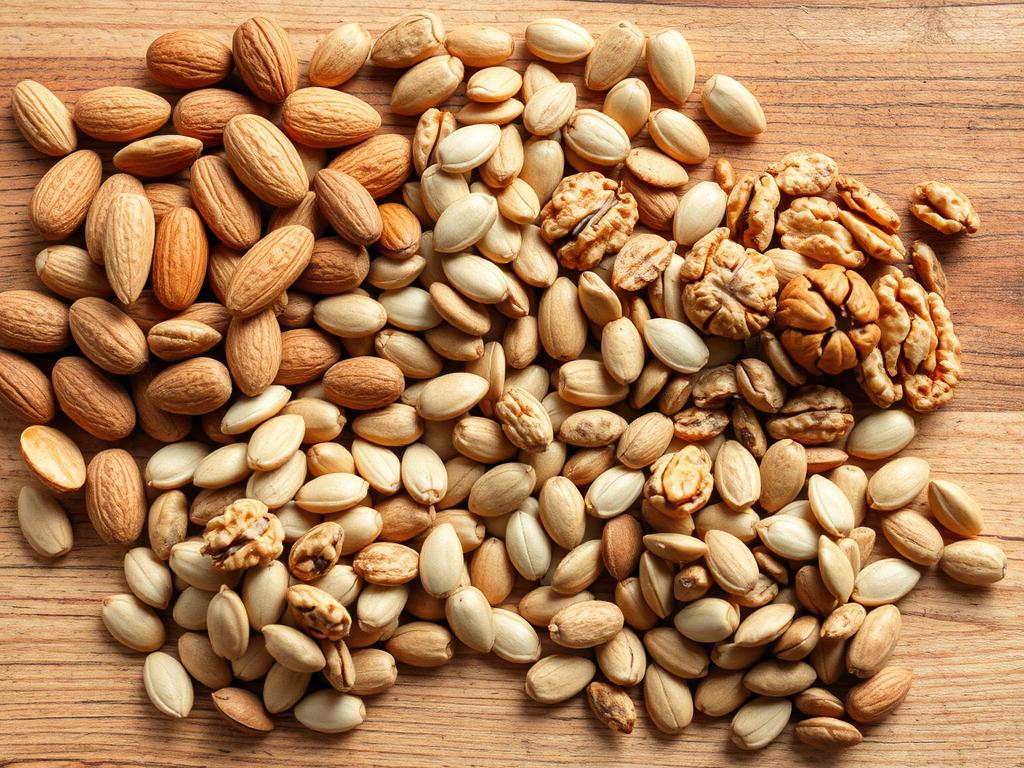
Vitamin E is a powerful antioxidant that helps the body fight off infection. Research published in the Journal of the American College of Nutrition shows that vitamin E enhances T cell function, a critical component of your adaptive immune response.
Almonds
Almonds are packed with vitamin E, with a half-cup serving providing approximately 100% of the recommended daily amount. They also contain manganese, magnesium, and fiber. A 2016 study in Immunology Letters found that the skin of almonds contains polyphenols that may help prevent viral infections.
Sunflower Seeds
Sunflower seeds are exceptionally high in vitamin E, with just 1 ounce containing 76% of your daily recommended intake. They’re also rich in selenium, which according to research in the journal Advances in Nutrition, plays a vital role in reducing inflammation and enhancing immunity.
Probiotic-Rich Fermented Foods
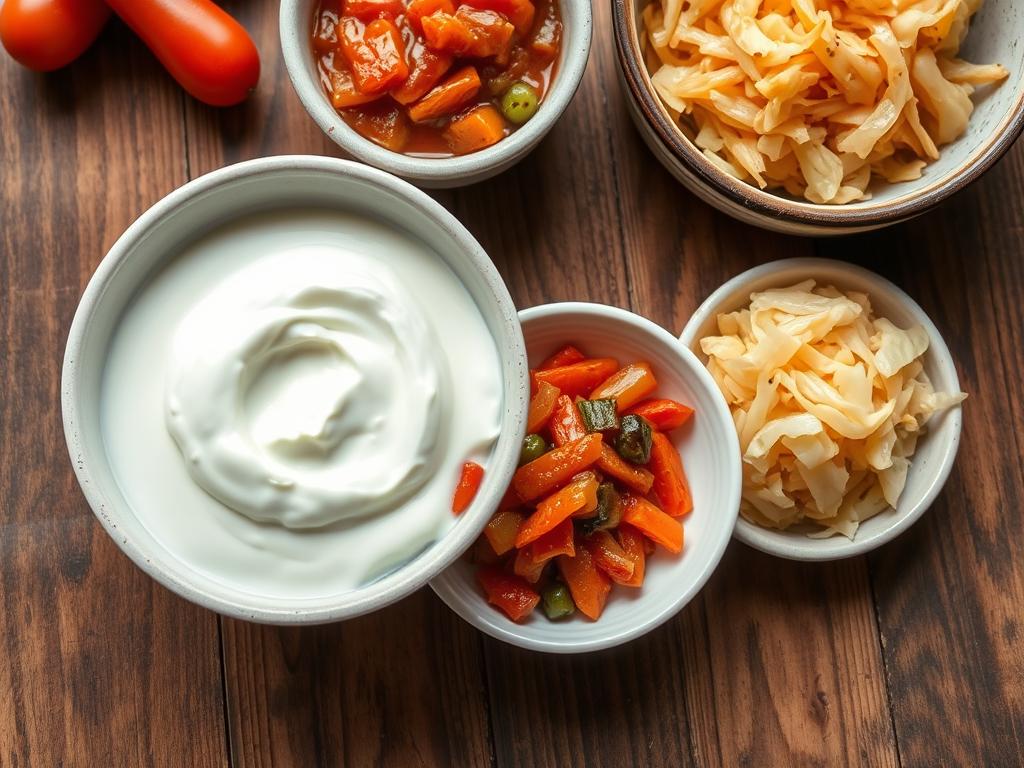
The gut microbiome plays a crucial role in immune function, with approximately 70% of your immune system residing in your gut. Fermented foods contain beneficial bacteria that support this gut-immune connection.
Yogurt
Look for yogurts labeled with “live and active cultures.” A 2017 study published in Nutrients found that regular consumption of probiotic yogurt can stimulate the immune system by increasing the production of natural antibodies. Greek yogurt is particularly beneficial as it typically contains more protein than regular yogurt.
Pro Tip: Choose plain yogurt and add your own fruit for sweetness. Many flavored yogurts contain excessive added sugars that can counteract the immune benefits.
Other Beneficial Fermented Foods
- Kefir (fermented milk drink)
- Kimchi (Korean fermented vegetables)
- Sauerkraut (fermented cabbage)
- Miso (fermented soybean paste)
- Kombucha (fermented tea)
Anti-inflammatory Turmeric and Green Tea
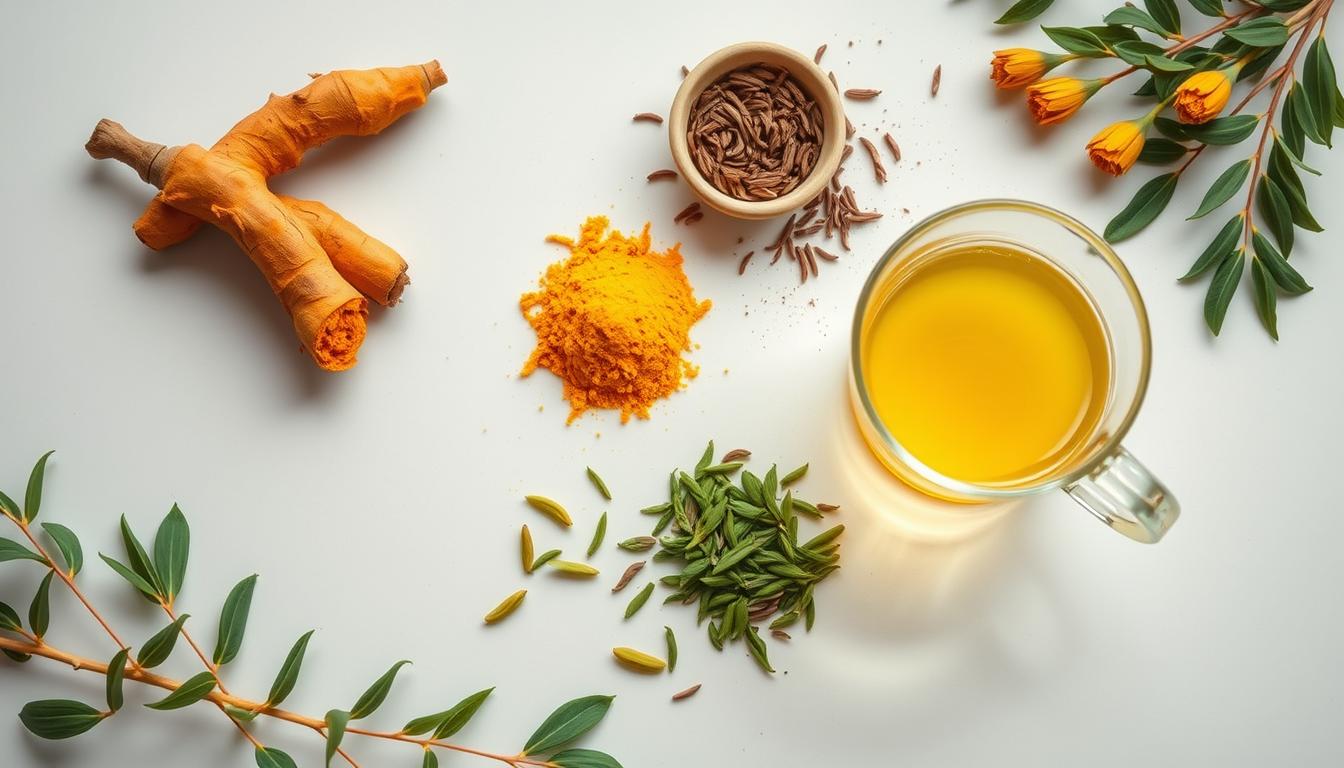
Turmeric
This bright yellow spice contains curcumin, a compound with powerful anti-inflammatory effects. According to a 2020 review in Frontiers in Immunology, curcumin can modulate the activation of T cells, B cells, and other immune cells, potentially enhancing the body’s ability to fight infections.
For maximum absorption, combine turmeric with black pepper, which contains piperine that enhances curcumin absorption by up to 2,000%.
Green Tea
Green tea is packed with flavonoids, a type of antioxidant. It also contains epigallocatechin gallate (EGCG), another powerful antioxidant that has been shown to enhance immune function. Research published in the Journal of Ethnopharmacology found that EGCG may inhibit the replication of various viruses and enhance the body’s immune response to infections.
For optimal benefits, steep green tea for 3-5 minutes at 175-180°F (not boiling) to preserve its beneficial compounds.
Vitamin C-Rich Tropical Fruits
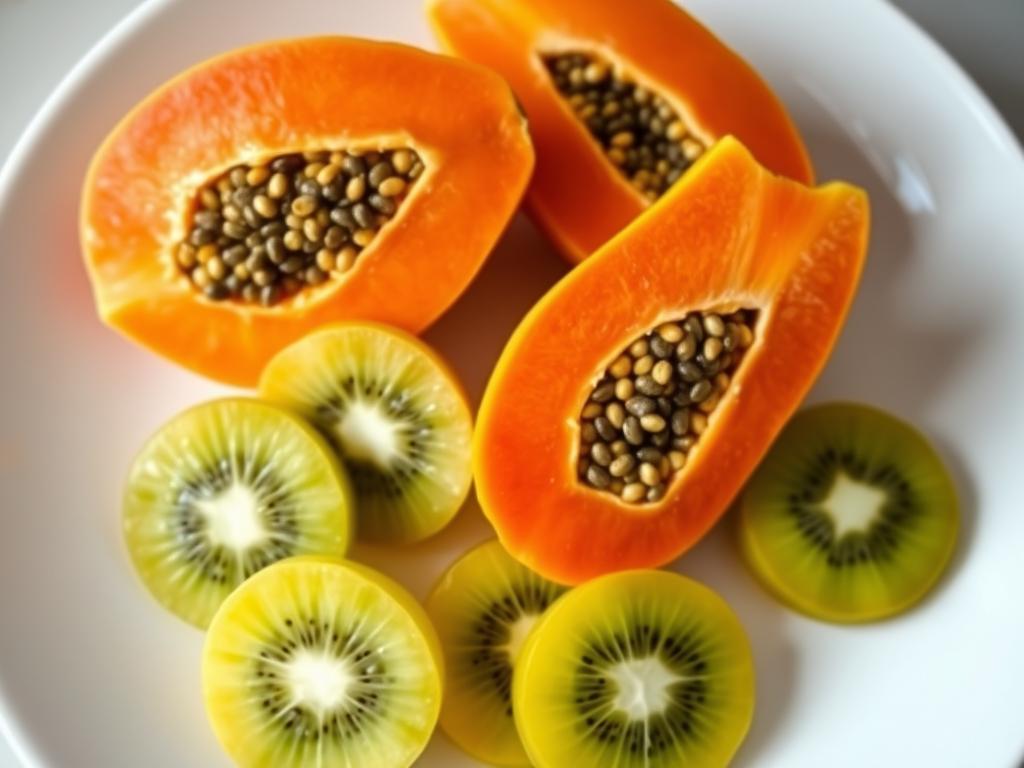
Papaya
Papayas contain an impressive amount of vitamin C—a single medium fruit provides over 200% of the recommended daily intake. They’re also rich in papain, a digestive enzyme with anti-inflammatory properties. A study in the Journal of Ethnopharmacology found that papaya extract may have immunomodulatory effects, helping to regulate immune response.
Kiwi
Kiwis are another vitamin C powerhouse, with one medium fruit containing more than 100% of your daily needs. They’re also rich in folate, potassium, and vitamin K. Research published in the British Journal of Nutrition found that consuming kiwifruit can enhance the activity of certain immune cells and reduce the severity and duration of upper respiratory infections.
How These Foods Work Together
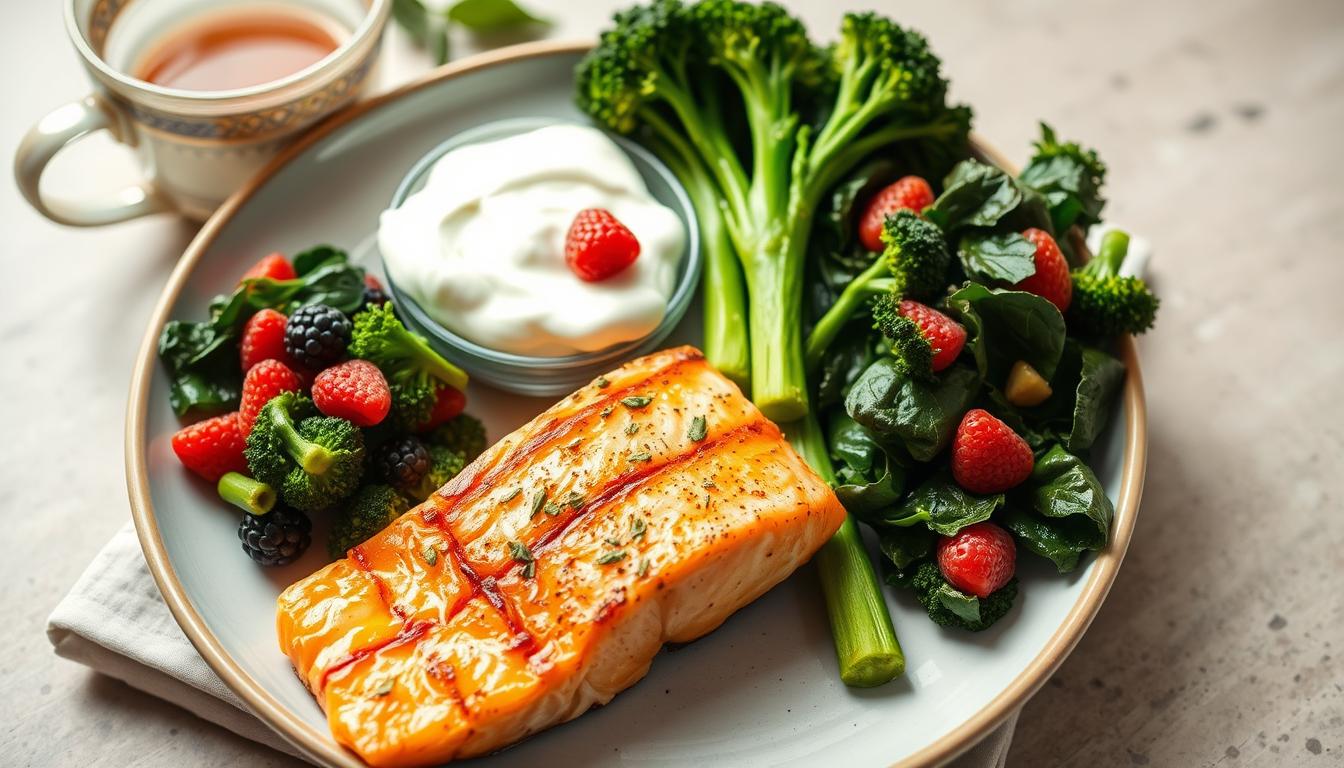
The most effective approach to strengthening your immune system is consuming a variety of these foods regularly. Research from the American Journal of Clinical Nutrition shows that different nutrients work synergistically—meaning their combined effect is greater than the sum of their individual effects.
“The immune system is complex and requires multiple micronutrients, including vitamins A, D, C, E, B6, and B12, folate, zinc, iron, copper, and selenium, which play vital, often synergistic roles at every stage of the immune response.”
For example, vitamin C helps your body absorb iron more efficiently, while vitamin D works with vitamin A to regulate immune responses. This is why a diverse diet is more effective than focusing on a single “superfood.”
Practical Ways to Incorporate Immune-Boosting Foods
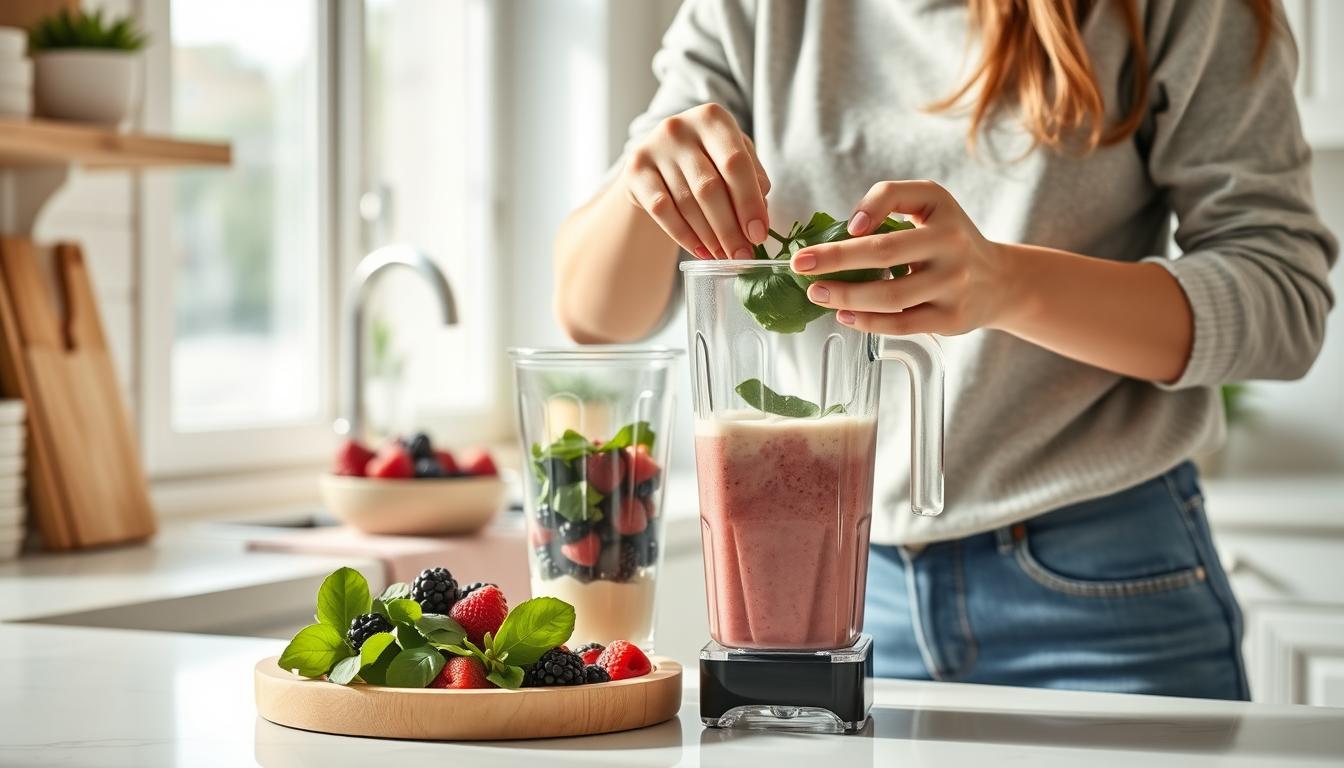
Quick Meal Ideas
- Immune-Boosting Smoothie: Blend yogurt, spinach, berries, and a small piece of ginger for a nutrient-packed breakfast.
- Salmon and Vegetable Bowl: Combine baked salmon with steamed broccoli, red bell peppers, and a turmeric-yogurt sauce.
- Garlic and Ginger Stir-Fry: Sauté your favorite vegetables with minced garlic, ginger, and a protein source.
- Citrus and Nut Salad: Toss spinach with orange segments, almonds, and a light vinaigrette.
Storage Tips to Preserve Nutrients
- Store citrus fruits at room temperature for maximum vitamin C retention.
- Keep nuts and seeds in airtight containers in the refrigerator to prevent their oils from going rancid.
- Store leafy greens with a paper towel in the refrigerator to absorb excess moisture.
- Freeze berries when they’re in season for year-round access to their immune-boosting properties.
Beyond Diet: Other Immune-Supporting Habits

While nutrition plays a crucial role in immune function, research from the Journal of Sport and Health Science shows that other lifestyle factors are equally important:
Regular Exercise
Moderate-intensity exercise for 30-60 minutes most days of the week can boost the circulation of immune cells. A 2019 study in the Journal of Sport and Health Science found that even a single session of moderate exercise can boost the effectiveness of vaccines and help fight infections.
Quality Sleep
During sleep, your immune system releases proteins called cytokines that help fight infection. Research from the Journal of Experimental Medicine shows that consistent sleep of 7-9 hours optimizes immune function and enhances T cell activity.
Stress Management
Chronic stress elevates cortisol levels, which can suppress immune function. Techniques like meditation, deep breathing, and yoga have been shown in studies published in the Annals of the New York Academy of Sciences to reduce stress hormones and support immune health.
Conclusion: A Holistic Approach to Immune Health
Boosting your immune system naturally requires a comprehensive approach centered around nutrient-dense foods. By regularly incorporating citrus fruits, colorful vegetables, fatty fish, nuts, seeds, and fermented foods into your diet, you provide your body with the essential vitamins, minerals, and antioxidants needed for optimal immune function.
Remember that consistency is key—occasional consumption of these foods won’t provide the same benefits as making them regular staples in your diet. Combined with adequate sleep, regular exercise, and stress management, these dietary choices create a strong foundation for a resilient immune system.
Take Your Immune Health to the Next Level
Want to implement these immune-boosting foods into your daily routine? Download our free 7-day immune-supporting meal plan with shopping lists and easy recipes featuring all the foods covered in this article.
Get well and stay well,
Ray Baker.


